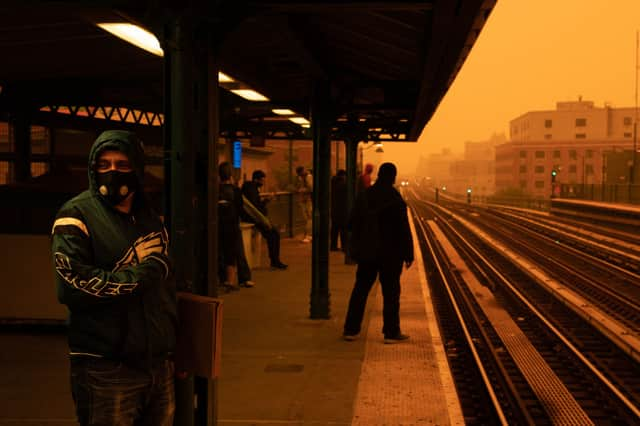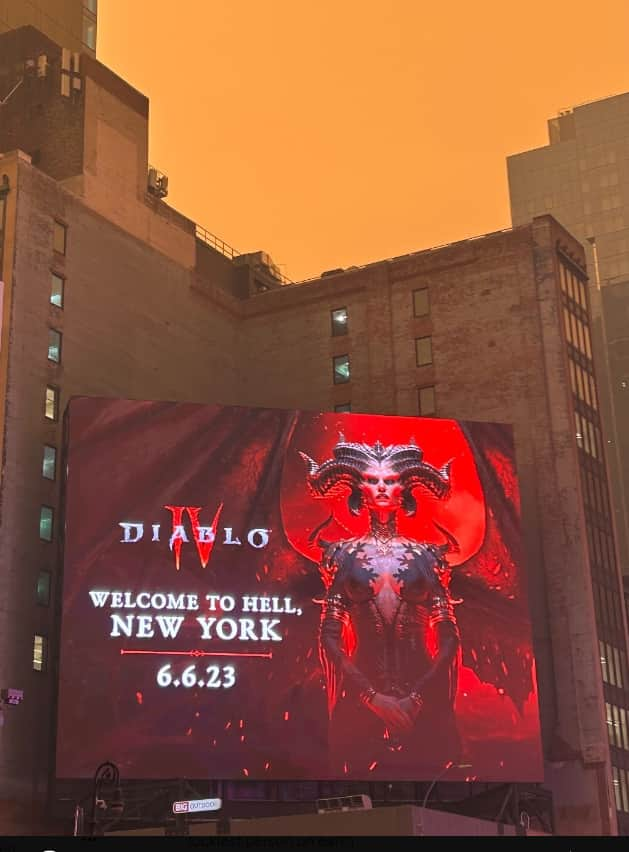‘Welcome to Hell, New York’: the billboard that inadvertently nailed the climate crisis


One of the most shared images of New York to emerge from the after-effects of the Canadian wildfires this week was a billboard in Manhattan for the video game Diablo IV.
Its tagline of “Welcome to Hell, New York” was a perfect example of life imitating art, set as it was against an ominous orange sky that looked like it was on fire. The marketers behind the game could not have planned it any better if they’d tried:
Advertisement
Hide AdAdvertisement
Hide Ad

Of course, the apocalyptic scenes in Canada and the eastern States should not be viewed as simply a social media-friendly spectacle. They are apocalyptic in a very real sense - the direct result of our impact on the climate.
While the wildfire season in Canada always runs from late Spring through to October, destruction on this scale, this early in the season, is extremely rare. The fires have already burned through more than 3.3 million hectares of land - an area bigger than Wales.
Already, it looks like Canada is set to have its most destructive wildfire season in history. It comes after much of North America has registered record heat and drought, as climate change continues to warm the planet.
It’s not a problem unique to that part of the world, as we’re all too aware. An expert told our reporter Isabella Boneham that wildfire season here “will extend into the autumn” in future and be more like Mediterranean regions. Dr Gareth Clay of the University of Manchester said the UK is likely to see “more extreme fire behaviour” including longer flame lengths, which will make “control and suppression more challenging”.
Advertisement
Hide AdAdvertisement
Hide AdThis week has been a grim one, even by climate news standards. We also learned that scientists are likely to record a global average temperature of more than 1.5C above pre-industrial levels over the next five years. The World Meteorological Organisation said that there is a 66% chance of this temperature being recorded at least once between now and 2027 – which would mark the first time in human history.
Then there was the news that Arctic summer sea ice could be wiped out in as little as 10 years - a decade earlier than previously predicted.
News like this can be hugely dispiriting - it can make us resigned to inaction and a feeling of helplessness. But it’s too easy to look away: we need to confront the challenge, to make tiny changes to our own consumption habits, and to demand more action from our policy-makers.
Why? Because amidst all of the negative headlines, there are also more hopeful stories every day, like the scientist using ‘skeletons’ made from construction waste to restore coral reefs, the breweries starting to capture carbon from beer, or research showing that major polluters are starting to see their share prices fall in the wake of climate lawsuits.
Advertisement
Hide AdAdvertisement
Hide AdIt’s vital that we look for the solutions and acknowledge the progress, as well as staying cognisant of the facts around the climate crisis.
📺 In this week's Screen Babble podcast, Alex reviews The Crowded Room, Steven revisits Drop the Dead Donkey, and Kelly reacts to The Idol and The Full Monty.
📧 You can email me with any feedback on this or any of our stories at [email protected].
Have an enjoyable weekend - and be mindful of the thunderstorms ⛈
This is an abridged version of our NationalWorld Today newsletter - you can sign up for free to read the full version.
Comment Guidelines
National World encourages reader discussion on our stories. User feedback, insights and back-and-forth exchanges add a rich layer of context to reporting. Please review our Community Guidelines before commenting.
